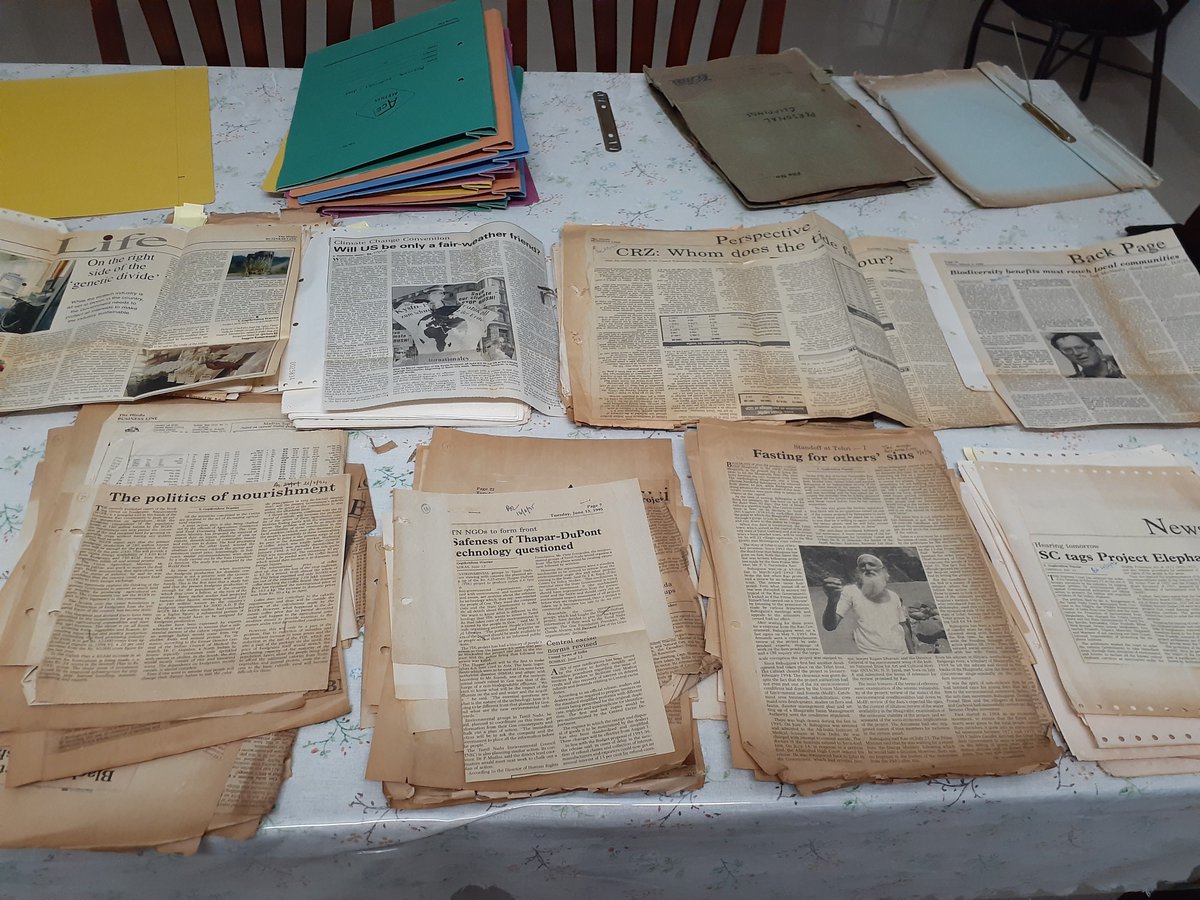Recently I sorted my stories on fading-newsprint clippings from the 1990s. These were my clippings from the Down to Earth magazine (1992-1993) and The Hindu Business Line newspaper (1994-2002). Together, this covered the first decade since the launch of economic liberalisation.
The big ticket event in this period was the United Nations Conference on Environment and Development (UNCED) of the Rio Summit of 1992. In fact, DtE was launched in time for the conference.
The other big development of 1992 was the passage of the 73rd and the 74th amendments to the Constitution, which took devolution of political power to the rural and urban panchayats. These amendments were the forerunners of many other governance changes that happened later.
Transiting from the 1980s, during which the anti-Narmada dam and the anti-Tehri dam movements were strong, during the 1990s these people’s movements declined in strength. Sunderlal Bahuguna fasted a few times against the Tehri, and Medha Patkar and team against the Narmada dam.
But both the dams materialised, with the environment movements facing reverses in the Supreme Court. The public attention on these movements also decreased during the 1990s. The only spike was when Arundhati Roy led urban dwellers into the Narmada valley in the mid-1990s.
If there is anything that distinguished the 1990s from the decades that came before and after, it is the judicial activism in environment. A combination of Supreme Court lawyer M.C. Mehta and judge Justice Kuldip Singh were at the heart of many environmental judgements in 1996.
The Vellore tanneries case, where the precautionary principle and the polluter pays principle were implemented through case law; and the judgement banning industrial aquaculture within the coastal regulation zone – are among the notable examples.
Also in 1996 was the first order on the T.N. Godavarman Thirumulkpad versus the Union of India, in which Justice J.S. Verma and B.N. Kirpal, opened up for review the entire forest policy of the country. The case went on for years in the Supreme Court, and later in the NGT.
It all started when Thirumulkpad, the former feudatory of Nilambur bordering Kerala and Tamil Nadu Nilgiris filed a petition in the Supreme Case stating that despite the state taking over his private family forests, it was not taking care of the natural heritage.
The Kyoto Protocol of 1997 established a framework of GHG emissions trading globally. Since India did not have to have emission reduction targets, developed countries made a beeline to collaborate with India through the Clean Development Mechanism.
So much so that when US President Bill Clinton visited India in 2002, his biggest hand for collaboration was on green technologies. Standing in front of the Taj Mahal, he offered a green handshake to India.
During the 1990s, India worked systematically to develop a biodiversity legislation through a process of citizen engagement along with discussions in the Parliament. The Biodiversity Act was passed by the Parliament in 2002. It operationalised the guiding principles of the CBD.
In 1996 the international environmental activist group Greenpeace entered the country. This changed environmental activism in India, from the earlier pattern of community protests to new tools such as dramatic protests, litigation, media campaigns, and even online campaigns.
In 1995, as the term of the 1991-96 Jayalalitha government was coming to an end in Tamil Nadu, there wasn’t much to show in terms of industrialisation. With much fanfare the state government invited two projects that had been rejected by communities in other part of the country.
Thapar DuPont Ltd. was invited to establish a nylon 6,6 facility outside Chennai, and Sterlite was invited to establish a copper smelter off Thoothukudi. While TDL left soon selling its facility, Sterlite stayed on and continues to create environmental controversies.
In 2001, the state government in Tamil Nadu changed again from the DMK to the AIADMK. Hyundai car company, established during the DMK period, got a notice from the TNPCB to stop their operations. They were accused of not using eco-friendly processes in their production.
I am given to understand that Hyundai paid its respects to the new government, and their operation ban was revoked. Ah, for the pleasures of an environment journalist’s existence!
@atuldeulgaonkar, @joydeepgupta, @scurve, @keyaacharya, @rmnth, @kalpana1947, @shaibaba, @patralekha2011, @flvisha, @ShreyaDasgupta, @ShripadManthan, @ramreddy, @pamelaphilipose, @CholamandalPann, @vrsrini, Do check the above tweets for a flashback to the 1990s.

 Read on Twitter
Read on Twitter


